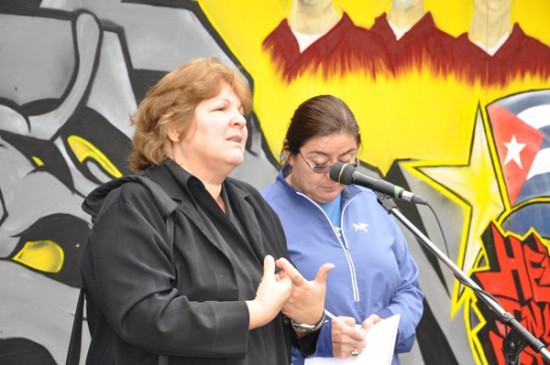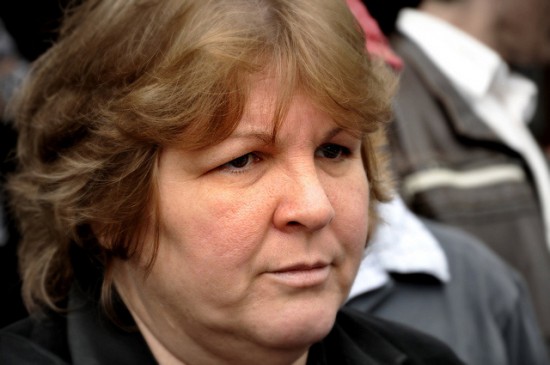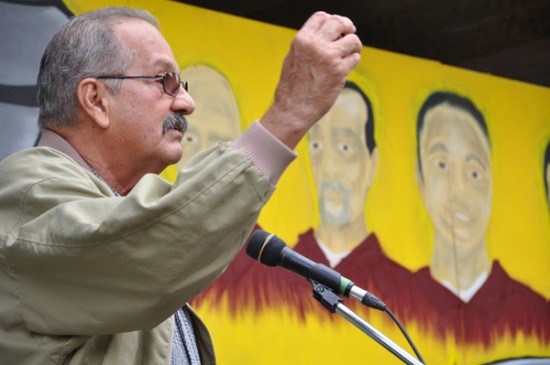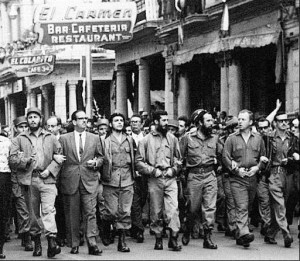 As G8 world leaders met behind barricades and riot police lines in Toronto, Canada, I was in a run-down community hall in East Vancouver listening to people from one of the world’s poorest countries talk with pride about their gains in healthcare and literacy and refer to their leaders by their first names: Fidel, Che, Camilo, Raul.
As G8 world leaders met behind barricades and riot police lines in Toronto, Canada, I was in a run-down community hall in East Vancouver listening to people from one of the world’s poorest countries talk with pride about their gains in healthcare and literacy and refer to their leaders by their first names: Fidel, Che, Camilo, Raul.
As G8 world leaders discussed slashing deficits in half by 2013, more economic restraint and the reality of a global economy, representatives from Cuba spoke proudly about how 40% of their budget is devoted to healthcare and education despite a U.S. embargo that has lasted for four decades in an effort to turn the Cuban people against Fidel Castro.
I was at the 3rd International Che Guevara Conference in Vancouver to interview Aleida Guevara, pediatrician and daughter of Che Guevara, one of the leaders of the Cuban Revolution.
 Ernesto “Che” Guevara was killed by the Bolivian army in complicity with the CIA in 1968 while trying to spark a revolution in the impoverished Latin American country.
Ernesto “Che” Guevara was killed by the Bolivian army in complicity with the CIA in 1968 while trying to spark a revolution in the impoverished Latin American country.
His daughter, now 50, shares her father’s passion and his original vocation — doctor. Like her father, she is adamant that free education and healthcare are basic human rights and should not provided only to those who can pay.
It’s a right, Guevara said, that Cuba takes seriously which is why the country provides free training to people from around the world who want to become doctors, and also sends legions of doctors and teachers to foreign countries like Venezuela and Haiti to provide free healthcare.
Not Slick But Sincere
With its lack of corporate sponsorship and a location removed from the typical pricey conference centres, the 3rd Annual Che Guevara Conference, hosted by Vancouver Communities in Solidarity with Cuba, was admittedly not a huge draw. But what it lacked in slick marketing and high-tech, it made up for in its inclusive atmosphere for approximately 250 people. No one was charged for entry. No one was shut up or shut down even if it meant the agenda ran long. Lunch was by donation, or free if money was an issue.
Amongst the 250 attendees were people from Honduras, El Salvador, Cuba, Venezuela, the US and Canada. Speakers ranged from Dr. Guevara to Samira Amndam, diplomatic attache at the Consulate of the Bolivarian Republic of Venezuela in Toronto and several Americans including Walter Lippmann of Cuba News and Larry Mosqueda, professor of Political Economy at Evergreen State University.
The conference began with the unveiling of a mural by the graffiti artist Josue Gonzalez, of the Cuban Five. Cuba considers these five men, held in U.S. prisons, to be held as political prisoners and has demanded their release.
Aleida Guevara Reme mbers Father
mbers Father
At midday, following a presentation of the film “Aleida Guevara remembers her father” an emotional Guevara took the stage and said the film for her is like an onion. “It always makes me cry.”
Guevara lost her father at age seven when he left Cuba in an attempt to export revolution to other parts of Latin America. She has spent her life following in his footsteps as a medical doctor and revolutionary, and has worked in some of the world’s poorest places, including Angola, Ecuador and Nicaragua. She is the author of Chavez, Venezuela and Latin America.
“We cannot speak about peace in this world while there is even one human being without healthcare,” she said, quoting her father.
For Guevara, doing what is right is not extraordinary — she says her father would not have considered what he did unique or worthy of praise either. “He acted as a man should… He didn’t think he was doing anything extraordinary.”
While many aspects of Che Guevara’s vision may not have survived in contemporary Cuba, this vision for 100% literacy and free universal healthcare has flourished.
According to independent sources, Cuba has the highest doctor-to-population ratio in the world and has sent thousands of doctors to more than 40 countries around the world. After the Haitian earthquake, Cuba did not need to send many doctors to respond to the massive earthquake because 400 Cuban doctors were already there working amongst the poor.
The UN reports the average life expectancy in Cuba is 78.3 years, ranking Cuba 37th in the world and 3rd in the Americas, behind only Canada and Chile, and just ahead of the U.S. Infant mortality rates are comparable to Canada and better than the U.S.
How Are We So Bad?
“People say ‘Cuba is so bad, but they have good, free healthcare,’” said Miguel Fraga, press and cultural attaché at the Cuban Embassy in Canada. “People say ‘Cuba is so bad, but they have good education…’ So how are we so bad?”
Fraga said Cuba has 2,300 schools, and students who live in remote areas with no electrical power are still given equal access to education — solar panels are installed to ensure lights, computers and VCRs [yes, Cuba still uses VCRs] are powered. Seventeen of the schools have only one student but remain open anyway.
Despite these impressive figures, Fraga and Guevara admitted the island nation is not perfect. “We have made mistakes but we try to learn from them and correct them,” said Guevara, adding that Cuba has been forced to overcome extraordinary economic repression placed on the country by the U.S.-led long time embargo against the island nation.
Asked if she has seen any change in the US policy to Cuba under Barack Obama, she shook her head. “Nothing has changed,” she said, adding that Obama was under pressure from interests even before he became president, and the campaign promise to close Guantanamo Bay remains unfulfilled.
In a 1903 treaty, the US leased the Guantanamo Naval Base on the eastern tip of the island. Cuba disputes the lease, saying that it was concluded under duress, and has refused to cash any of the U.S. cheques since the early days of the revolution.
“We are not a threat to the U.S. The U.S. could obliterate us 100 times over if they wanted to,” said Guevara. She talked about Bush’s vow to fight against terrorism anywhere in the world. “But they are the world’s worst terrorists.”
Even so, “When the people of the United States begin to realize the power they have…then this world will change, but whatever method it takes to do it, it will be welcome.”
The Man and the Myth
The conference featured many lighter moments as well. When asked how her father would feel about the mass use of his image, Guevara said, “He would laugh; my father was above that. Then, with a chuckle she added, “There is an old man, Granado, who said ‘Can you imagine Che on all those women’s breasts!’”
 Even 42, years after Che Guevara’s death, strong emotions are still alive. Tears came easily to the eyes of Manuel Yepe, who was a member of the July 26th movement in Matanzas leading up to the triumph of the Cuban revolution, and worked with Guevara afterward. He recalled that even before the triumph, Che Guevara was already “a myth”.
Even 42, years after Che Guevara’s death, strong emotions are still alive. Tears came easily to the eyes of Manuel Yepe, who was a member of the July 26th movement in Matanzas leading up to the triumph of the Cuban revolution, and worked with Guevara afterward. He recalled that even before the triumph, Che Guevara was already “a myth”.
Yepe, whose family became friends with the Guevaras, was so in awe of Che that “I never could talk to him as a friend because he was, well…” Yepe pauses and struggles for words, “he was wonderful.”
Today, Yepe is journalist and professor of the Superior Institute of International Relations of Havana but he doesn’t forget the man who inspired him. “I was always sorry that I had not had the chance to continue with him…to die with him…I’ll try to be faithful to his teachings until the end of my life.”
A Changing Latin America
While G8 and G20 leaders met amidst the arrests of more than 600 protestors in Toronto, representatives of Venezuela, Cuba, Brazil, Bolivia and Argentina met in Ecuador to determine their own futures. The Bolivarian Alternative for Latin America and the Caribbean (ALBA) has been formed as an alternative to Free Trade Area of the Americas (ALCA or FTAA).
Instead of a focus on transnational trade and market liberalization, ALBA’s mandate is to put emphasis on the struggle against poverty and social exclusion and represent the Latin American people, not global or northern interests.
Is it any wonder this approach is being welcomed after 30 years of U.S.-dominated neo-liberalism which saw Latin America poverty rates increase from 19% in the 70s to 44% in the 90s and the U.S. backing of brutal dictatorships who bowed to U.S. demands.
G8/G20 Pushes Contrasting Agenda
As more than 600 people were arrested on the streets of Toronto for protesting the G8/G20, and the Prime Minister of Canada said the weekend’s violence went a long way to explain why security costs (exceeding $1 billion) were so high, I sat in a large room in East Vancouver thinking about how many people $1 billion could feed and educate.
 And I had a strange moment where I left the matrix of my own culture and looked at my country and its eroding healthcare and crumbling education, and I began to think how wonderfully nice Canadians have been while our future has been undermined and our sovereignty sold. Our complacency stood out in stark contrast to the Cuban people’s ongoing determination to decide their fate as a sovereign nation, and their bewilderment that a country of just 12 million on a small Caribbean island could pose such a threat to the U.S. and inspire such hatred and a cruel embargo.
And I had a strange moment where I left the matrix of my own culture and looked at my country and its eroding healthcare and crumbling education, and I began to think how wonderfully nice Canadians have been while our future has been undermined and our sovereignty sold. Our complacency stood out in stark contrast to the Cuban people’s ongoing determination to decide their fate as a sovereign nation, and their bewilderment that a country of just 12 million on a small Caribbean island could pose such a threat to the U.S. and inspire such hatred and a cruel embargo.
I thought about this again as just an hour ago I watched Canadian Prime Minister Steven Harper wrapping up the back-to-back G8 and G20 Conferences with the words, “As I constantly remind Canadians, there isn’t really a Canadian economy anymore; it’s a global economy.”
What would happen to us if we refused to pay or play?
Lines are being drawn like never before and I can’t help but think of what Che Guevara said: “I knew that when the great guiding spirit cleaves humanity into two antagonistic halves, I will be with the people.”
Photo Credits
“Che Guevara” Source Unknown
“Aleida Guevara” photos by ChrisHoltPhotos
“Manuel Yepe” by ChrisHoltPhotos
“Che in Cuba, third from left” AP photo


Enter at http://cheguevara-fanclub.blogspot.com/ and leave a comment about Che Guevara
Your comment will be published in a book about Che Guevara
Best comment will receive a free book
Fanclub Che Guevara
I think we’ve had it good in Canada for so long, that we’ve become the frogs in the slowly heating water. We wait for another election, another hockey game, another person to speak up. Gradually, as you say, we are eroding as a society. It scares me, and I wonder who we expect will take the step to shake us all awake.
It saddens me that so many of the good people I meet won’t run for political office because the public will just pick at their lives until politics and social good takes a back seat. Nathan speaks of American Idol – we seem to be living it in our public arenas too.
Good article – please keep poking the stick and maybe some of us hibernators will wake up and take action!
Kerry you are amazing!
I have never heard of this conference. But I have seen “The Power of Community, How Cuba survived Peak Oil” and Cuba is so far ahead of us in so many ways. I don’t think if I believe in a global economy and what Cuba is doing is the way of the future.
Thanks for your brilliant article.
Janet
wow. Kerry, another breath stealing, gut hitting piece. yes, so many are in a self induced denial/distraction. But when you are living it, with it, or among it, there is NO turning your head, only your stomach.
You’re an amazing woman and writer.
Keep it up, thanks for another amazing piece! M
Thank you, Mary.
I very proud of the art work my son did on this mural of the cuban five,yes I a very proud father of an amazing artist…
PS. love you mijo…
This is a really interesting post. I can’t believe no one has commented on it. Obviously, from my own Che post, I’ve had some kind of connection with his ideas and how they might be worth a second look.
I’ve watched from down in the U.S. with dismay as the Harper administration has managed to somehow stay in power (thanks in part to the Governor General), and has been working to dismantle a lot of the things Canada has been admired for.
And the G20 summit security – well, we had our own police state in my city of St. Paul, MN two years ago. I was about 10 minutes from being on the wrong bridge at the wrong time, and would have been amongst the 800+ arrested to “protect” John McCain and the Republicans. An absolute joke. And scary also. I live right on the edge of downtown, had helicopters over my apartment 24 hours a day for a week, and as a bicyclist, I was a suspect the moment I started riding.
None of this bodes well for either the U.S. or Canada. We’re in trouble, and it really will take people getting together and making things change for the better because none of these elected officials are going to flinch as long as the majority of folks are too busy watching American Idol or playing Farmville on Facebook.
I think you hit the nail on the nose with your last statement. We are being entertained into subservience to the corptocracy. We’re in such deep trouble.
Thanks Nathan and Chris…
It is amazing to me how many people simply don’t care or don’t know about the G8/G20 and it’s impact on all of our lives. I think we in Canada are so blessed with peace and a generally good standard of living (I say generally because more and more Canadians are slipping below the poverty line) that we simply don’t want to open our eyes and see that our way of life is eroding…and we are letting it happen. But hey, you’re right Nathan, it’s easier to watch American Idol.
Canadians used to have the best healthcare system in the world. It was a right. Now some politicians act like it’s a luxury. Same with education. If anyone out there gets a chance, I strongly recommend reading Naomi Klein’s book The Shock Doctrine. It shines light in some pretty dark corners and talks about a lot of things you have both brought up.